 Petzlover
Petzlover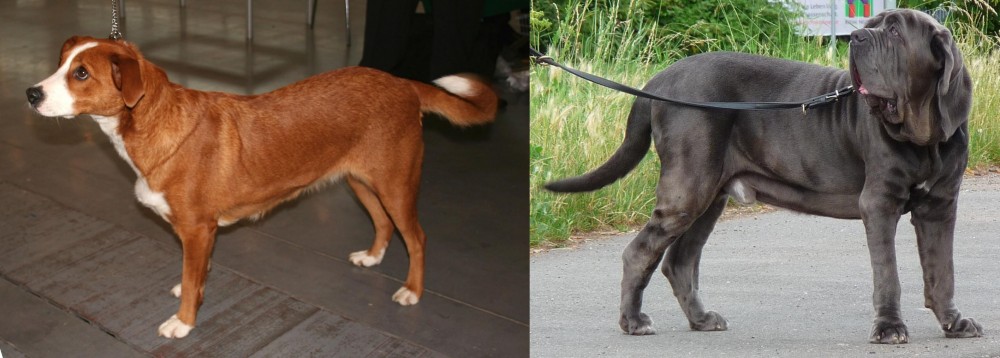 Austrian Pinscher is originated from Austria but Neapolitan Mastiff is originated from Italy. Austrian Pinscher may grow 20 cm / 7 inches shorter than Neapolitan Mastiff. Austrian Pinscher may weigh 61 kg / 134 pounds lesser than Neapolitan Mastiff. Austrian Pinscher may live 5 years more than Neapolitan Mastiff. Austrian Pinscher may have less litter size than Neapolitan Mastiff. Austrian Pinscher requires High Maintenance. But Neapolitan Mastiff requires Moderate Maintenance
Austrian Pinscher is originated from Austria but Neapolitan Mastiff is originated from Italy. Austrian Pinscher may grow 20 cm / 7 inches shorter than Neapolitan Mastiff. Austrian Pinscher may weigh 61 kg / 134 pounds lesser than Neapolitan Mastiff. Austrian Pinscher may live 5 years more than Neapolitan Mastiff. Austrian Pinscher may have less litter size than Neapolitan Mastiff. Austrian Pinscher requires High Maintenance. But Neapolitan Mastiff requires Moderate Maintenance
 The Australian pinscher exists from the early nineteenth century in Australia. They were originally breed and raised to be great family pet and the guard of the property. They don’t have the gene for a hunting and that’s why they were kept close to the family. Since they were thought to live in areas where they can roam and run free, they have a high daily need for the activity.
The Australian pinscher exists from the early nineteenth century in Australia. They were originally breed and raised to be great family pet and the guard of the property. They don’t have the gene for a hunting and that’s why they were kept close to the family. Since they were thought to live in areas where they can roam and run free, they have a high daily need for the activity.
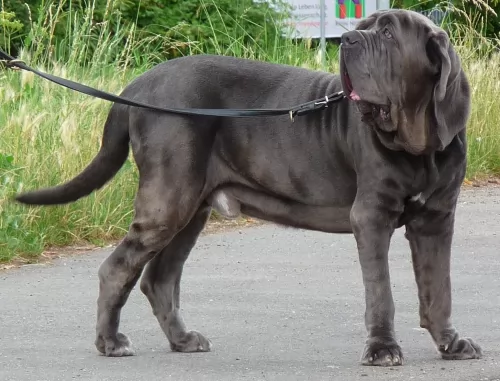 An ancient breed, the Neapolitan Mastiffs are massive dogs with a history of protecting their family and their property. The breed has deep rooted protective instincts and they are very frightening in appearance. The Neapolitan is of the Molosser group of dogs, all of whom probably came from the same line. It is known that all the mastiffs in Europe are descendants of the Tibetan Mastiff. The Tibetan Mastiff is considered the most ancient of all canines.
An ancient breed, the Neapolitan Mastiffs are massive dogs with a history of protecting their family and their property. The breed has deep rooted protective instincts and they are very frightening in appearance. The Neapolitan is of the Molosser group of dogs, all of whom probably came from the same line. It is known that all the mastiffs in Europe are descendants of the Tibetan Mastiff. The Tibetan Mastiff is considered the most ancient of all canines.
The Asian Mastiffs came from India to Greece around 300 BC with Alexander the Great. Then the breed was brought to the Romans by the Greeks and then introduced them in their circus in fights. Another possibility is that around 500 BC the mastiffs came to Britain from the Phoenicians. Either way the Roman Molossus is the ancestor of the Neapolitan Mastiff.
The Romans crossed the breed with the English Mastiff around 55 BC and developed a premiere war dog that was called a Mastini.
The breed eventually became extinct in Europe with the exception of Campania. The breed was recognized in 1946 with the standard accepted in 1949. However, it is believed that the Neapolitan Mastiff has been continuously present in Campania for over two thousand years. The breed was initially developed as war dogs and for the Roman coliseum spectacles.
In 1946 Dr. Piero Scanziani established a program to breed them in Italy. He wrote the breed standard in 1949.
Today the Neo is a farm dog, an army dog, a police dog and a guard dog. They were shown in Italy for the first time in 1946 but only in 2004 was the breed recognized by the American Kennel Club (AKC). It was 1973 when the Neapolitan Mastiff Club of America was born and 1996 when the standard was approved by the AKC. They are still a rare breed in the United States.
 The Australian pinscher, medium sized dog breed, with strong and solid body muscularity, is a happy dog with generally very positive personality. They don’t weight much, and they have usually athletic bodies because they are very active dog kind. Their head is built as a roundish triangle with wrinkled wide forehead and strong cheekbones. They have strong scissor bite and usually darker lips. They have brown or golden brown lively eyes, medium to small ears that fit perfectly to the head size. Their tails are most of the time happy and up in the air, usually fluffy because of the longer hairs on the tails.
The Australian pinscher, medium sized dog breed, with strong and solid body muscularity, is a happy dog with generally very positive personality. They don’t weight much, and they have usually athletic bodies because they are very active dog kind. Their head is built as a roundish triangle with wrinkled wide forehead and strong cheekbones. They have strong scissor bite and usually darker lips. They have brown or golden brown lively eyes, medium to small ears that fit perfectly to the head size. Their tails are most of the time happy and up in the air, usually fluffy because of the longer hairs on the tails.
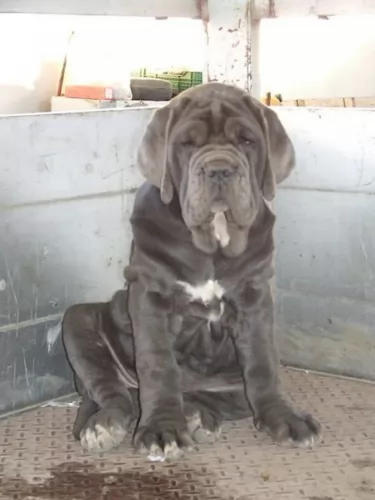 The Neapolitan Mastiff is a massive dog , so powerful and very intimidating in his looks. With an incredibly large head and hanging folds and wrinkles, the Neo is an impressive animal. His inner nobility and dignity is evident in his stance and the way he holds himself. He is relaxed, calm, quiet yet imposing none the less. His coat is dark whether black, tawny, gray or mahogany. He is muscular beyond imagination. The Neo is 10-15% longer than he is tall.
The Neapolitan Mastiff is a massive dog , so powerful and very intimidating in his looks. With an incredibly large head and hanging folds and wrinkles, the Neo is an impressive animal. His inner nobility and dignity is evident in his stance and the way he holds himself. He is relaxed, calm, quiet yet imposing none the less. His coat is dark whether black, tawny, gray or mahogany. He is muscular beyond imagination. The Neo is 10-15% longer than he is tall.
On his massive head his eyes are deep set and covered by his eye lids that droop. His eyes are blue as puppies then dark and coordinated with his coat. and his nose is large and the color of his coat. Ears are natural or can be cropped, and they carry their tail straight and curving back. The Neo has round paws and arched toes.
 If you decide to have an Austrian pinscher as a pet in a family with small children, you will make a great choice. Their playful nature and energetic behaviour have been accepted by the children very well. They have an affectionate attitude towards their family, and they will be the great watchdog for your children.
If you decide to have an Austrian pinscher as a pet in a family with small children, you will make a great choice. Their playful nature and energetic behaviour have been accepted by the children very well. They have an affectionate attitude towards their family, and they will be the great watchdog for your children.
Guarding a farm, large yard, animals on the farm or in a yard. Guarding and playing with children, long runs or long bike rides. They will follow you anywhere.
Since they are great with the family and children as well, they can’t be rated with a five-star grade for stranger friendliness and other dog’s friendliness. Sure, they can be trained to be very socialized if you have the time and the patience, but if you don’t you shouldn’t be surprised if they are generally not stranger friendly. It’s their nature. They are devoted only to the family and they usually have a hard time when their family leaves them. This breed is not advisable to be kept indoors or with the seniors that don’t move much.
The Austrian pincher's ability to learn fast and be trained quickly is not super good. They do well – they will listen to their owners always but they are not so great when it comes to learning trick for fun. They will be more than happy to run to catch the ball, but they won’t give it back because they can play alone. They can be learnt to do the basic things, but their lovable and playful nature will overall and they will end up asking for an ear scratch or a belly rub.
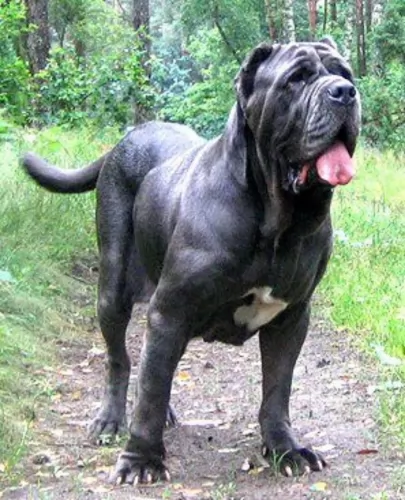 Older children in their family. No toddlers or strangers.
Older children in their family. No toddlers or strangers.
Protective yet quiet, calm, relaxed
No they won’t adapt well to apartment living or to strangers.
They are intelligent and trainable but must be socialized and know the human is the alpha or they will take over.
 They usually have no health issues like skin irritations, problems with eyes or ears, but they need to be groomed regularly because they shed a lot. They don’t need the regular baths, but when you do bathe them, take a good care of washing and rinsing their thick undercoat. Keep their ears clean and their claws tidy, and you will be happy together. There is a normal percentage of the joint injuries and heart malfunctions due to the increased activity. But, if you take a good care of your Austrian Pinscher, you wouldn’t have to worry about this at all.
They usually have no health issues like skin irritations, problems with eyes or ears, but they need to be groomed regularly because they shed a lot. They don’t need the regular baths, but when you do bathe them, take a good care of washing and rinsing their thick undercoat. Keep their ears clean and their claws tidy, and you will be happy together. There is a normal percentage of the joint injuries and heart malfunctions due to the increased activity. But, if you take a good care of your Austrian Pinscher, you wouldn’t have to worry about this at all.
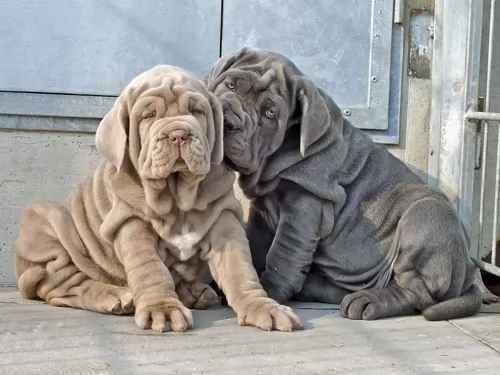 The Neapolitan Mastiff is prone to many of the same issues as any massive, extra large breed. The most common of these is Cherry Eye.
The Neapolitan Mastiff is prone to many of the same issues as any massive, extra large breed. The most common of these is Cherry Eye.
 Just like any other active dog, the Austrian Pinscher loves to eat. But they usually know their limit and they are almost never obese. While they are pups, it is best for them to have meals in the morning, afternoon and in the evening. Meals should be rich in nutrients and in small portions. When they grow up, they will need two meals during the day. Take a good care while feeding them – read about the portion needed for their weight and don’t give him extra portions or human junk food. They generally don’t like raw meat, but you can chance on of the daily portions with some meat cooked in the water without any spices.
Just like any other active dog, the Austrian Pinscher loves to eat. But they usually know their limit and they are almost never obese. While they are pups, it is best for them to have meals in the morning, afternoon and in the evening. Meals should be rich in nutrients and in small portions. When they grow up, they will need two meals during the day. Take a good care while feeding them – read about the portion needed for their weight and don’t give him extra portions or human junk food. They generally don’t like raw meat, but you can chance on of the daily portions with some meat cooked in the water without any spices.
Organize your day to have an hour or two for this lovely pet. Austrian pinscher likes to be cuddled, petted and being played with. Be affectionate towards this dog breed because they will be happier and more protective towards you. They like to show love but they also have a need to be appreciated and loved. Keep them off the leach as much as possible and don’t leave them alone for a long period.
This lively and energetic dog breed will do well while they have enough place to run. If you have a small yard, take them for a run with you or drive a bike and let them follow. They like to bark, and they will do that if they want your attention.
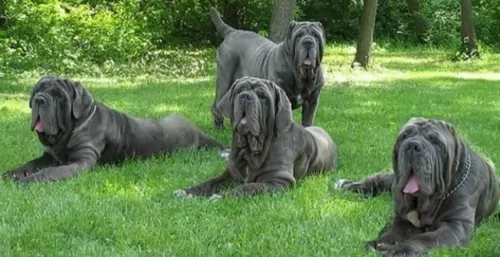 Neapolitans grow fast and so don’t overfeed when they are young. Lower protein and higher fat content.
Neapolitans grow fast and so don’t overfeed when they are young. Lower protein and higher fat content.
Don’t overfeed the adult as they can become obese.
This big hearty breed needs exercise but not too much. They overheat easily. The puppy will push himself, so you have to make sure he doesn’t over do it. No tug of war games. They need a long walk twice every day.